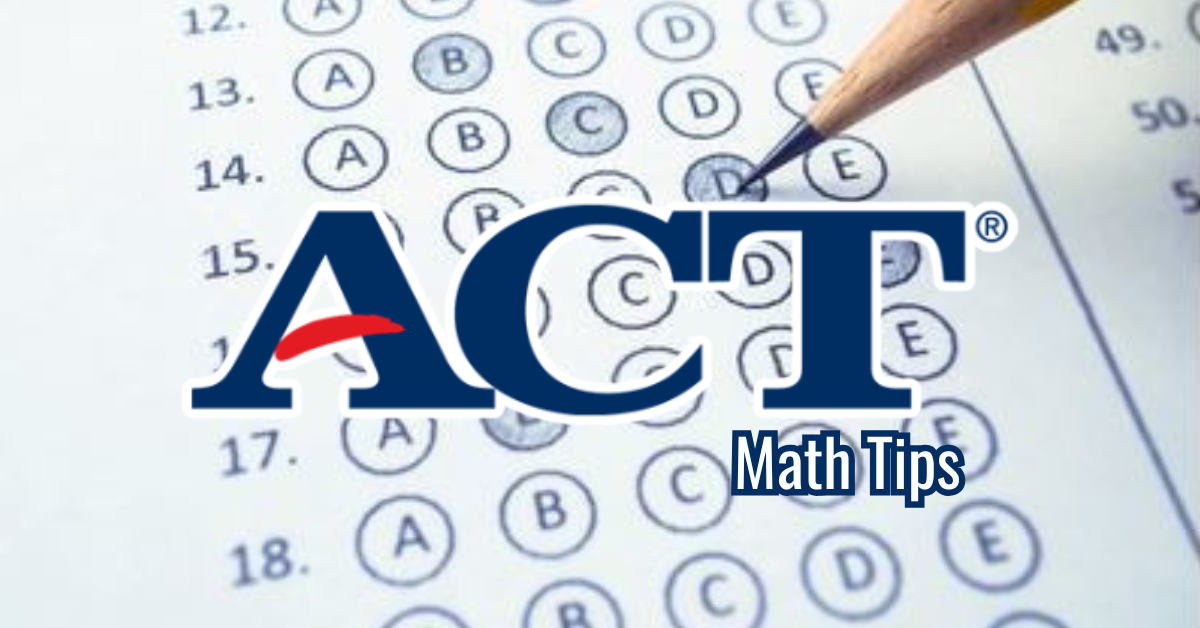ACT Math can be… a lot. Maybe math was never really your thing, and now this section has you panicking. Or maybe you used to be good at it, but algebra feels like it happened three centuries ago, and you’re staring at your prep book thinking, “Where do I even start?”
Totally valid.
The truth is, no matter if you’re starting from scratch or brushing up rusty skills, there are smart ways to prep. These can make a big difference in both your confidence level going into the test, and your actual score.
With the right ACT math tips and just a bit of targeted practice, you can walk into test day feeling calm, confident, and ready to handle whatever equations they throw at you.
In this blog, we’ll share 13 simple (but seriously useful) ACT math section tips to help you study smarter, not harder.
Need help with more than just math? Whether you’re brushing up on grammar rules with ACT English tips or trying to speed up your reading strategy using ACT reading tips, the right approach can make a huge difference.
13 ACT Math Tips
1. Know What’s on the ACT Math Section
Before you start with your ACT prep, make sure you know what you’re actually up against.
You’ll get:
- 60 math questions
- 60 minutes to answer them
- Questions from pre-algebra, algebra, geometry, and a bit of trigonometry
The questions start off easy and gradually get harder. So pace yourself and don’t let one tough or confusing question throw you off.

2. Memorize Important Math Formulas
The ACT won’t give you a formula sheet. If you blank on the quadratic formula or forget the area of a circle, you’re on your own.
We’re not saying this to make you even more stressed. It’s just very important to study all the right formulas so you don’t lose points unnecessarily.
Some must-know formulas are:
- Area of a triangle = ½ × base × height
- Distance = rate × time
- Slope = rise/run
- Quadratic formula (yes, the whole thing)
How you memorize them is up to you. You can:
- Use flashcards (physical or digital)
- Stick formulas on your mirror, desk, or wall
- Try memory tricks or mnemonics
- Teach them out loud to someone else (or your dog…still counts!)
- Practice using them in ACT math practice questions
We all have our own learning styles so figure out what works best for you. The more you interact with the formulas in your own way, the more automatic they’ll come to you on test day.
3. Brush Up on the Basics
If you haven’t looked at fractions or percentages since middle school, now’s your moment. The ACT loves throwing in “easy” problems to see if you’re paying attention.
So review your:
- Fractions
- Ratios
- Decimals
- Percents
- Exponents
These basics show up often and missing them can cost you points.
4. Don’t Skip ACT Math Practice
No surprise here: practicing with ACT math questions is one of the best ways to improve. You’ll soon start to notice patterns and common question types.
It’s best to start doing this once you have already reviewed the basics. Then you can set aside time for short sessions or full sections, and keep track of your accuracy. You’ll figure out which questions or formulas you still have trouble with (and then practice those again).
The more you practice, the less scary the real thing will feel. It’ll feel like you’re just taking another practice test and that can calm your nerves a lot.
Calm nerves and clear mind = better focus and higher scores.

5. Time Management = Survival
You’ve got one minute per question. But don’t let the clock stress you out.
Some questions take longer than a minute. Others are super quick. The important thing is to not get stuck. If a problem has you spinning in circles, skip it and come back later.
Ten minutes on one tricky question is not worth it. Even if you do figure out that answer in the end, you might have to skip multiple other questions due to the lost time.
6. Learn to Love Your Calculator
Your calculator is allowed, but it’s only helpful if you actually know how to use it.
Practice with it while you prep. Make sure it’s ACT-approved and that you’re not fumbling with the buttons during the test. (That is not the time to learn what “2nd” does.)
7. Estimate Before You Calculate
Sometimes you can eliminate wrong answers just by making a smart guess.
Example: If the question asks for a percentage and your math leads to 234%, you probably did something wrong. Use common sense and estimation to double-check your logic before going into full calculations.

8. Watch Out for Trick Questions
Some ACT math questions are worded to confuse you. Others contain “too obvious” answers that are actually wrong.
Take a breath, read carefully, and don’t assume the shortest path is the right one. If something feels weird or “too easy,” it might be worth rechecking.
9. Use the Process of Elimination
If you’re stuck, try crossing off obviously wrong answers.
Even narrowing it down to two options gives you a better shot. And yes, sometimes guessing is totally okay. There’s no penalty for wrong answers on the ACT. So never leave anything blank.
10. Get Good at Word Problems
Word problems are about translation just as much as they are about math. What does that mean? Basically, you’re taking a sentence written in regular English and turning it into a math problem.
For example, if a question says, “Sarah has twice as many apples as Jake,” you need to recognize that this means: Sarah = 2 × Jake
When you’re dealing with a word problem, read slowly. Underline or circle important info. Figure out what the question is really asking. Then turn the words into a math equation.
These questions can feel confusing at first, but the more you practice, the easier it gets. You’ll start to spot the same patterns again and again.

11. Take Full-Length Practice Tests
Yes, we already mentioned studying with real ACT questions in one of the previous ACT tips for math.
Here’s the thing: Sometimes you might only have the time or energy for one or two isolated questions. But full tests help you build test-taking stamina and get used to the timing. It’s not the most exciting way to spend a Saturday morning, but it works.
And don’t just go through the motions. Review your mistakes. Figure out why you missed a question and how to fix it next time.
12. Review Your Mistakes (Yes, Again)
It’s worth repeating: every wrong answer is a chance to learn. Don’t just check the answer key and move on. Dig into why you got something wrong and how to avoid making the same error again.
13. Build Your Study Stack
A little structure can go a long way. Invest in reliable prep materials like ACT test prep textbooks that match your learning style. You might do best with bite-sized lessons or full practice exams. There’s probably a book out there that will match your learning style. Find it (and actually use it).
You Don’t Need to Love Math…Just Use Our Smart ACT Math Tips
You don’t have to be a math genius to do well on the ACT math section. Honestly, even if you’re pretty solid with numbers, panicking over one hard question or mismanaging your time can still mess with your score. That’s why it’s not just about what you know but rather about how you approach the section.
Practice with purpose. Focus on your weak spots. Use the math ACT tips that make the most sense for you. And go into that test knowing you’ve got tools to handle whatever shows up: formulas, functions, and all.
If you need some more help on how to start studying for math or any of the other ACT sections, this guide on how to study for the ACT is a great resource.
Take a deep breath. You’re more prepared than you think.


